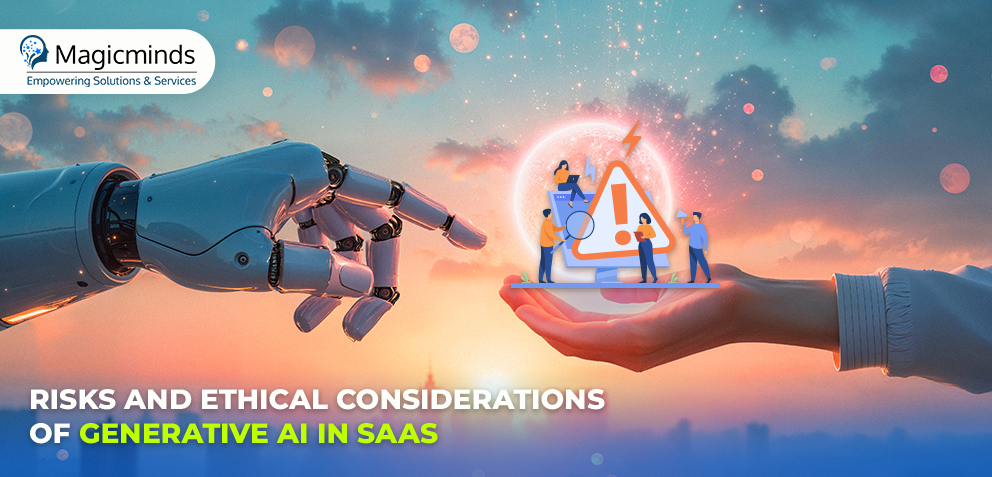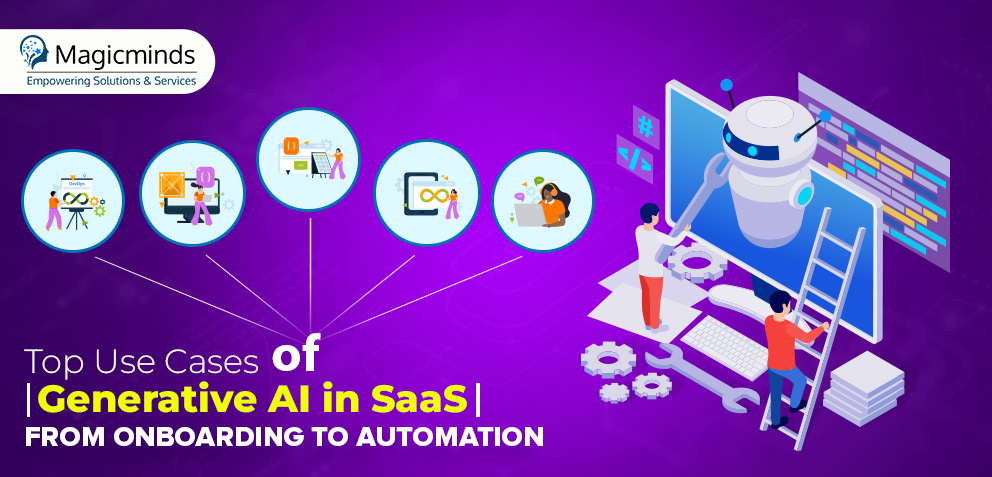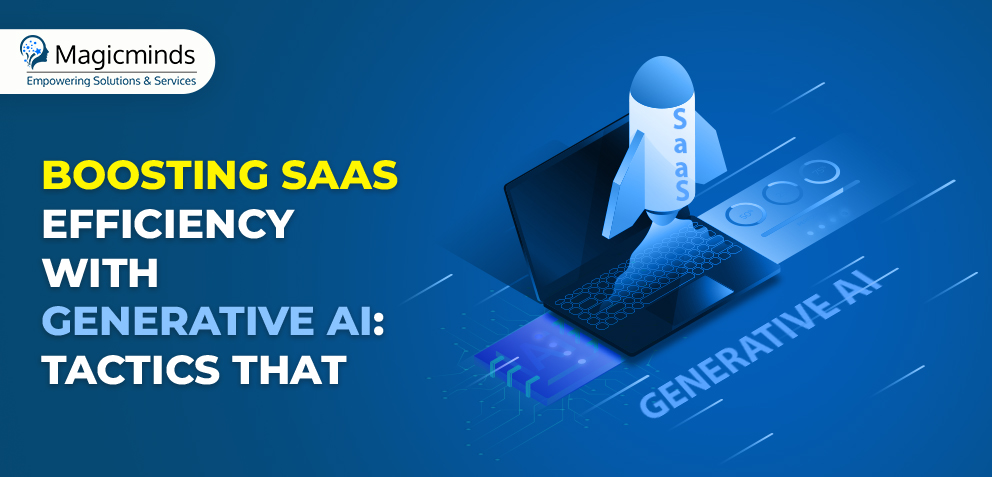Risks and Ethical Considerations of Generative AI in SaaS

 Stay In-the-loop
Stay In-the-loop
Get fresh tech & marketing insights delivered right to your inbox.
Share this Article
Tags
Category
- .Net Developer
- Adtech
- Android App Development
- API
- App Store
- Artificial Intelligence
- Blockchain Development
- Chatbot Development
- CMS Development
- Cybersecurity
- Data Security
- Dedicated Developers
- Digital Marketing
- Ecommerce Development
- Edtech
- Fintech
- Flutter app development
- Full Stack Development
- Healthcare Tech
- Hybrid App Development
- iOS App Development
- IT Project Management
- JavaScript development
- Laravel Development
- Magento Development
- MEAN Stack Developer
- MERN Stack Developer
- Mobile App
- Mobile App Development
- Nodejs Development
- Progressive Web Application
- python development
- QA and testing
- Quality Engineering
- React Native
- SaaS
- SEO
- Shopify Development
- Software Development
- Software Outsourcing
- Staff Augmentation
- UI/UX Development
- Web analytics tools
- Wordpress Development
he potential of generative AI is revolutionizing capabilities in software as a service (SaaS), from content creation to coding. However, this powerful technology also poses significant risks and ethical considerations that must be addressed by both providers and users. Not addressing these issues could result in facing litigation, harming the company’s reputation, and losing user trust. Let’s get a good read on these generative AI risks that can lead to legal repercussions, reputational damage, and erosion of user trust.
Common Risks: Hallucinations, Model Bias, Security
Various risks come with implementing generative AI in SaaS systems. The major issue of hallucination, where AI models produce factually absurd outputs, is particularly problematic in tasks that need high accuracy.
Including AI bias within training data also poses a concern, as it can disproportionately reinforce existing societal gaps and discrimination. Moreover, the addition of generative AI raises important security concerns, as it can leak sensitive information trapped within these models.
Data breaches involving these models can expose sensitive information used to train or operate them, while advanced attacks can take advantage of their AI.
Privacy and Data Compliance (GDPR, HIPAA)
Professionals ensure compliance in generative AI in SaaS development with regulations related to privacy and data protection.
The General Data Protection Regulation (GDPR) in Europe and the Health Insurance Portability and Accountability Act (HIPAA) in the United States impose strict requirements regarding data processing, consent, and security.
Supervision of compliance concerning generative AI models is necessary. Knowing the geolocation of the training data and how the user data is applied, as well as applying effective anonymization methods, are important from the perspective of compliance and user privacy protection.
Grow Faster and Unlock Your Potential with AI & ML Development Services
Transform your business with cutting-edge AI and ML solutions.
Ethical AI Frameworks and Guidelines
Establishing ethical issues in AI SaaS frameworks and guidelines is no longer optional but a necessity. These frameworks provide a structured approach to identifying, evaluating, and mitigating ethical risks associated with generative AI.
They often emphasize principles like fairness, transparency, accountability, and beneficence. Adopting and adapting existing ethical guidelines to the specific context of SaaS applications can help organizations build responsible AI systems and foster user confidence.
Transparent AI: Explainability and Auditing
Transparent AI, characterized by explainability and auditing, is vital for building trust and accountability. Users need to understand how AI models arrive at their outputs, especially in critical applications. Explain ability techniques allow for the interpretation of AI decision-making processes. Robust auditing mechanisms enable the tracking of model behavior, identification of biases, and verification of compliance.
This transparency is essential for addressing concerns about the “black box” nature of some AI algorithms.
Red Flags in Vendor Tools
When integrating third-party generative AI tools into SaaS offerings, it’s crucial to be vigilant for red flags. Concerns should arise from a lack of transparency regarding data usage, unclear model training processes, the absence of bias mitigation strategies, and weak security protocols. Thorough due diligence, including detailed vendor assessments and security audits, is essential to avoid inheriting the risks associated with poorly designed or ethically questionable AI solutions.
Mitigation Best Practices
Proactive mitigation best practices are essential for navigating the risks and ethical challenges of generative AI in SaaS. Implementing robust data governance policies, employing detection of bias in industry-specific AI SaaS systems and mitigation techniques, ensuring data anonymization and security, and establishing clear lines of responsibility are critical steps. Continuous monitoring of AI model performance, regular audits, and ongoing ethical evaluations will contribute to building safer and more trustworthy generative AI-powered SaaS applications.
Bottom-line
By acknowledging and actively addressing these risks and ethical considerations, SaaS providers can harness the transformative power of generative AI responsibly, fostering innovation while safeguarding user trust and ensuring long-term sustainability. For cutting-edge data analytics solutions that prioritize ethical considerations, explore the offerings at MagicMinds.
The potential of generative AI is revolutionizing capabilities in software as a service (SaaS), from content creation to coding. However, this powerful technology also poses significant risks and ethical considerations that must be addressed by both providers and users. Not addressing these issues could result in facing litigation, harming the company’s reputation, and losing user trust. Let’s get a good read on these generative AI risks that can lead to legal repercussions, reputational damage, and erosion of user trust.
Common Risks: Hallucinations, Model Bias, Security
Various risks come with implementing generative AI in SaaS systems. The major issue of hallucination, where AI models produce factually absurd outputs, is particularly problematic in tasks that need high accuracy.
Including AI bias within training data also poses a concern, as it can disproportionately reinforce existing societal gaps and discrimination. Moreover, the addition of generative AI raises important security concerns, as it can leak sensitive information trapped within these models.
Data breaches involving these models can expose sensitive information used to train or operate them, while advanced attacks can take advantage of their AI.
Privacy and Data Compliance (GDPR, HIPAA)
Professionals ensure compliance in generative AI in SaaS development with regulations related to privacy and data protection.
The General Data Protection Regulation (GDPR) in Europe and the Health Insurance Portability and Accountability Act (HIPAA) in the United States impose strict requirements regarding data processing, consent, and security.
Supervision of compliance concerning generative AI models is necessary. Knowing the geolocation of the training data and how the user data is applied, as well as applying effective anonymization methods, are important from the perspective of compliance and user privacy protection.
Ethical AI Frameworks and Guidelines
Establishing ethical issues in AI SaaS frameworks and guidelines is no longer optional but a necessity. These frameworks provide a structured approach to identifying, evaluating, and mitigating ethical risks associated with generative AI.
They often emphasize principles like fairness, transparency, accountability, and beneficence. Adopting and adapting existing ethical guidelines to the specific context of SaaS applications can help organizations build responsible AI systems and foster user confidence.
Transparent AI: Explainability and Auditing
Transparent AI, characterized by explainability and auditing, is vital for building trust and accountability. Users need to understand how AI models arrive at their outputs, especially in critical applications. Explain ability techniques allow for the interpretation of AI decision-making processes. Robust auditing mechanisms enable the tracking of model behavior, identification of biases, and verification of compliance.
This transparency is essential for addressing concerns about the “black box” nature of some AI algorithms.
Red Flags in Vendor Tools
When integrating third-party generative AI tools into SaaS offerings, it’s crucial to be vigilant for red flags. Concerns should arise from a lack of transparency regarding data usage, unclear model training processes, the absence of bias mitigation strategies, and weak security protocols. Thorough due diligence, including detailed vendor assessments and security audits, is essential to avoid inheriting the risks associated with poorly designed or ethically questionable AI solutions.
Mitigation Best Practices
Proactive mitigation best practices are essential for navigating the risks and ethical challenges of generative AI in SaaS. Implementing robust data governance policies, employing detection of bias in industry-specific AI SaaS systems and mitigation techniques, ensuring data anonymization and security, and establishing clear lines of responsibility are critical steps. Continuous monitoring of AI model performance, regular audits, and ongoing ethical evaluations will contribute to building safer and more trustworthy generative AI-powered SaaS applications.
Bottom-line
By acknowledging and actively addressing these risks and ethical considerations, SaaS providers can harness the transformative power of generative AI responsibly, fostering innovation while safeguarding user trust and ensuring long-term sustainability. For cutting-edge data analytics solutions that prioritize ethical considerations, explore the offerings at MagicMinds.


